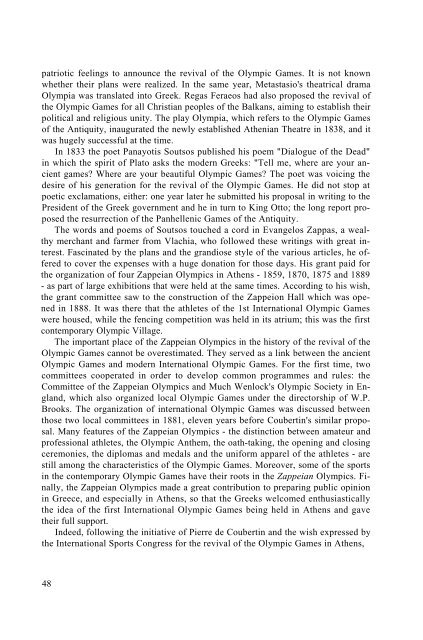Create successful ePaper yourself
Turn your PDF publications into a flip-book with our unique Google optimized e-Paper software.
patriotic feelings to announce the revival of the Olympic Games. It is not known<br />
whether their plans were realized. In the same year, Metastasio's theatrical drama<br />
Olympia was translated into Greek. Regas Feraeos had also proposed the revival of<br />
the Olympic Games for all Christian peoples of the Balkans, aiming to establish their<br />
political and religious unity. The play Olympia, which refers to the Olympic Games<br />
of the Antiquity, inaugurated the newly established Athenian Theatre in 1838, and it<br />
was hugely successful at the time.<br />
In 1833 the poet Panayotis Soutsos published his poem "Dialogue of the Dead"<br />
in which the spirit of Plato asks the modern Greeks: "Tell me, where are your ancient<br />
games? Where are your beautiful Olympic Games? The poet was voicing the<br />
desire of his generation for the revival of the Olympic Games. He did not stop at<br />
poetic exclamations, either: one year later he submitted his proposal in writing to the<br />
President of the Greek government and he in turn to King Otto; the long report proposed<br />
the resurrection of the Panhellenic Games of the Antiquity.<br />
The words and poems of Soutsos touched a cord in Evangelos Zappas, a wealthy<br />
merchant and farmer from Vlachia, who followed these writings with great interest.<br />
Fascinated by the plans and the grandiose style of the various articles, he offered<br />
to cover the expenses with a huge donation for those days. His grant paid for<br />
the organization of four Zappeian Olympics in Athens - 1859, 1870, 1875 and 1889<br />
- as part of large exhibitions that were held at the same times. According to his wish,<br />
the grant committee saw to the construction of the Zappeion Hall which was opened<br />
in 1888. It was there that the athletes of the 1st International Olympic Games<br />
were housed, while the fencing competition was held in its atrium; this was the first<br />
contemporary Olympic Village.<br />
The important place of the Zappeian Olympics in the history of the revival of the<br />
Olympic Games cannot be overestimated. They served as a link between the ancient<br />
Olympic Games and modern International Olympic Games. For the first time, two<br />
committees cooperated in order to develop common programmes and rules: the<br />
Committee of the Zappeian Olympics and Much Wenlock's Olympic Society in England,<br />
which also organized local Olympic Games under the directorship of W.P.<br />
Brooks. The organization of international Olympic Games was discussed between<br />
those two local committees in 1881, eleven years before Coubertin's similar proposal.<br />
Many features of the Zappeian Olympics - the distinction between amateur and<br />
professional athletes, the Olympic Anthem, the oath-taking, the opening and closing<br />
ceremonies, the diplomas and medals and the uniform apparel of the athletes - are<br />
still among the characteristics of the Olympic Games. Moreover, some of the sports<br />
in the contemporary Olympic Games have their roots in the Zappeian Olympics. Finally,<br />
the Zappeian Olympics made a great contribution to preparing public opinion<br />
in Greece, and especially in Athens, so that the Greeks welcomed enthusiastically<br />
the idea of the first International Olympic Games being held in Athens and gave<br />
their full support.<br />
Indeed, following the initiative of Pierre de Coubertin and the wish expressed by<br />
the International Sports Congress for the revival of the Olympic Games in Athens,<br />
48

















